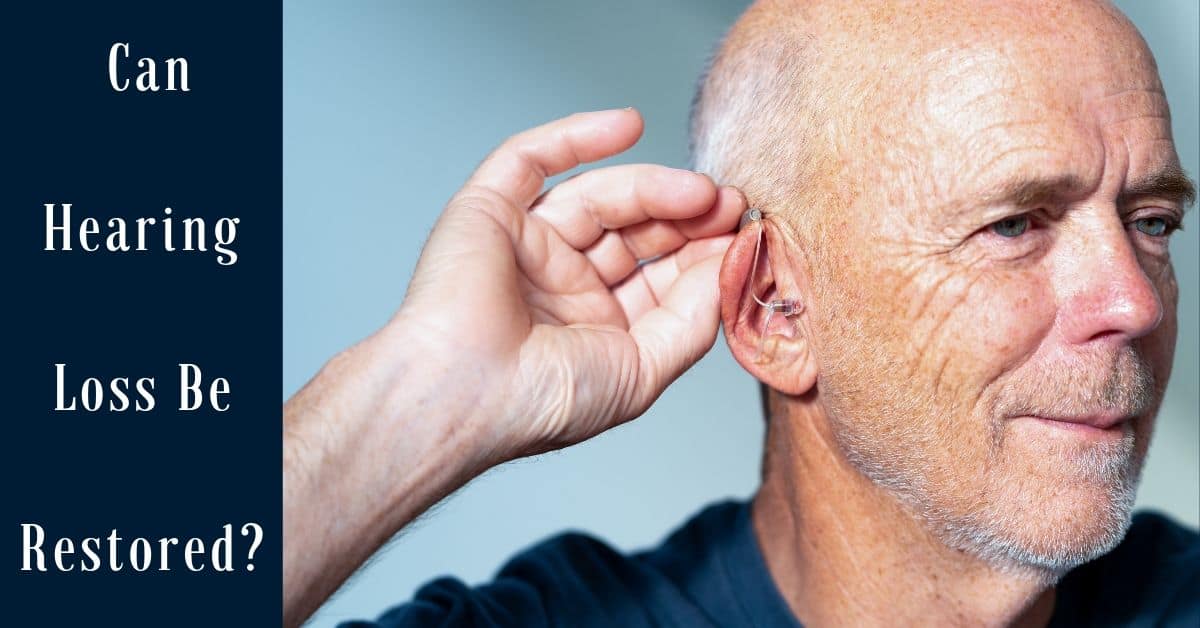
If you’ve been living with hearing loss, you’ve probably asked yourself, can hearing be restored? You’ve looked up articles online, and tried to find a doctor with natural remedies that can reverse your hearing loss. Sadly, your hearing cannot be restored, and once your hearing has been damaged, it will never come back. When it comes to managing your hearing loss, the best thing you can do is seek treatment as soon as possible, and enjoy all the benefits of clear hearing.
How Hearing Works
To understand how hearing works, let’s take a look at how we hear. Sound in the environment around you reaches your ears as sound waves. These sound waves travel down the ear canal to the middle ear, where they vibrate against the tympanic membrane. This sends vibrations through the fluid filled inner ear, where tiny hair cells sense the movement of the fluid, and translate these vibrations to electrical impulses. These are sent up the auditory nerve to the auditory centers in the brain, where your brain interprets the signals as sound.
When the cells in the inner ear or in the brain are damaged, you’ll experience hearing loss. These cells can’t be repaired or restored, so once you have hearing loss, the damage is permanent. That’s why your hearing can never be restored. However, that doesn’t mean you have to live with hearing loss forever.
Treating Hearing Loss as Soon as Possible
If you have hearing loss, you need to do something about it right away. You may think that your hearing loss isn’t holding you back, and that you can wait a few years before getting hearing aids. This is a dangerous thought. Hearing loss is a gradual process, and as your hearing slowly worsens, you won’t notice the day to day changes in your hearing abilities. What started as missing the odd sound hear and there, or not noticing the sounds of birds outside your window, will soon turn into major struggles in hearing, difficulty following conversations, and having a hard time localizing the sounds in your environment.
Untreated hearing loss will get worse very quickly. The brain has a remarkable ability to adapt to change, but when it comes to your hearing, this can actually be a bad thing. The cells in your brain that are responsible for hearing will get reallocated to your other senses, which means that even when you do treat your hearing loss, you’ll never be able to hear those sounds. Getting hearing aids as soon as possible will keep these cells dedicated to hearing, and you’ll be able to hear the full array of sounds around you.
Hearing Loss as Work
While you can’t restore your hearing, investing in a quality pair of hearing devices will give you back the ability to hear at work. If you’ve been struggling to hear, you’ve already noticed the difficulties it’s creating at the office. You can’t hear clearly in meetings, fail to hear a coworker speaking to you from across the room, and have difficulty focusing on tasks. Today’s hearing aids are sleek, sophisticated devices that sit snuggly behind the ear, or even with the ear or ear canal, and blend perfectly with hair or skin tones. Your coworkers won’t even notice your devices, but they will notice how sharp your hearing is, and how quickly you’re able to dive into group discussions and contribute your valuable knowledge to the team.
My Hearing Centers
Ready to treat your hearing loss? Don’t get hung up on restoring your hearing, but come find out what modern hearing technology can do for you. You’ll be able to follow conversations with ease, enjoy spending time with loved ones, and hear all the subtle sounds around you. You’ll experience clear hearing with reduced listening effort, and the best in directionality technology and speech enhancement. Learn about seamless connectivity to the technology you use the most, and the best in natural sound.
At My Hearing Centers, you’ll meet our team of dedicated hearing health specialists, and together we’ll find the perfect device to match your hearing loss, hearing needs, and lifestyle. Don’t wait for your hearing loss to get worse, but enjoy the benefits of early treatment, along with improved brain health and quality of life.
